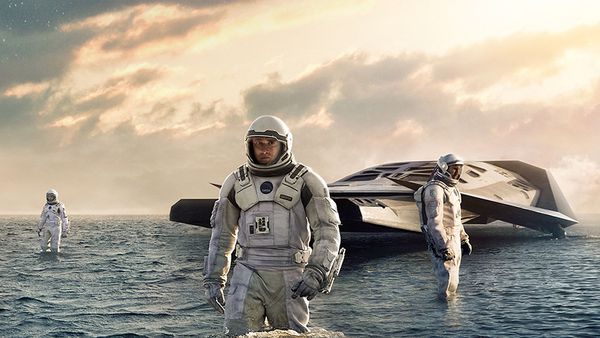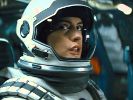Eye For Film >> Movies >> Interstellar (2014) Film Review
Interstellar
Reviewed by: Max Crawford

Tears have undergone a massive depreciation in recent days. It's currently impossible to do anything online without being confronted by people weeping over an advert for John Bloody Lewis. So when I say that I left Interstellar with water leaking from the corners of my eyes, understand that it takes more than a CGI penguin to reach me on an emotional level. Interstellar is the real deal.
We open in 1930s America—the Dust Bowl—or so it first seems, until the appearance of a laptop puts us squarely in a future where humanity has regressed. Crops have failed to the point where all that will grow is corn, famine is widespread and the world no longer has a use for scientists or engineers when what it needs is farmers.

This rather rubs engineer and scientist Cooper (Matthew McConaughey by way of Ed from Twin Peaks) up the wrong way, as engineering and science are the only things that could have saved his wife. I believe this puts the Christopher Nolan Dead Wife/Girlfriend As A Driver of Plot Tally up to five, but I'm happy to be corrected. Anyway, it's not long before Cooper ends up flying a mission for what's left of NASA, because obviously the world needs scientists and engineers now more than ever. What are you, an idiot?
Michael Caine, now running NASA, sends his daughter Amelia (Anne Hathaway, fresh from the Phantom Zone in Superman II) on the mission along with some forgettable supporting astronauts. The important thing is that Coop and Amelia don't get on. We are left to speculate that someday they might. There follows a very neat explanation of how wormholes go, a passable description of time-dilation effects inside the gravity well of a black hole, and a number of spectacular action sequences and 2001-esque spacecraft docking shots for people who have a hard time following chat about wormholes and black holes and other kinds of esoteric space-hole.
Fast forward through tragedy and hardship and betrayal and a rather silly climax that's still perfectly in keeping with the Sixties/Seventies pulp SF tone established earlier, because what Interstellar is really about is our future as a species. As Cooper puts it, “Mankind was born on Earth. It was never meant to die here.” In the long term, we have to think about how we get off this rock, and if Interstellar can highlight this issue for a mainstream audience, more power to it.
The main performances are compelling, the supporting actors largely forgettable. One particular highlight is Cooper's daughter Murphy, played by Mackenzie Foy. The relationship between Coop and Murph forms the emotional core of the film, and it's the reason I left the cinema with something in my eye. Even the occasional speech about the power of love transcending the bounds of time and space can't take the edge off Interstellar's emotional impact. T.A.R.S. Is also probably cinema's best robot since Gertie in Moon.
The film is a treat for those of us with bookshelves groaning under the weight of the SF Masterworks collection, and an introduction to a number of important ideas for everyone else. I'll be recommending Joe Haldeman's The Forever War to a number of people off the back of it. While it's let down by a little excess baggage and slight overdose of schmaltz, not many films are as important to the future of humanity as Interstellar.
Reviewed on: 07 Nov 2014
















